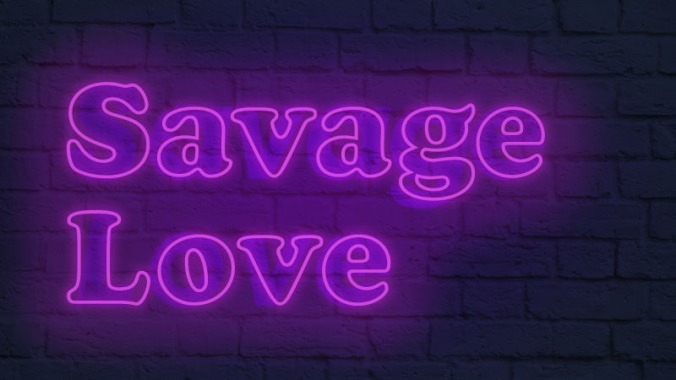This week in Savage Love: Overfished

I’m a heteroflexible married cis woman in my 40s. I’m also a POS cheater and a catfish. I really fucked up. One year ago, I met an older man in an online fetish forum. He sent me an unsolicited PM, and we have talked for hours every day since then. My husband, whom I’ve been married to for more than 20 years, does not know that I am having an emotional affair. I have no intention of telling my husband what I’ve done. I have been honest with my online boyfriend about everything except my name, my age, and the fact that I have a husband. (I know those are all really big things to lie about.) My boyfriend lied to me early on about his name, age, and relationship status, but came clean out of guilt. So I had the opportunity to say that I lied too, but I didn’t take it. I know what I’m doing is wrong. My husband would be very hurt if he knew. And my boyfriend, who wants to make a life together, would be very hurt as well. I’m in love with both men, but I’m not leaving my husband. I know the only right thing to do is break things off with my boyfriend. I’ve tried multiple times: I’ve told him that he is better off without me, that I’m a bad person, and that he shouldn’t trust me. Each time, he convinces me to stay. We have not been physical. We have never even been in the same room, much to his dismay. I have thought about telling him the truth, but I am worried about my safety, and I do not want to hurt him any worse than I already have. Plus, I’m a fucking coward. I am in treatment for PTSD. My therapist believes that my actions are a coping mechanism, i.e., it is easier to pretend to be someone else than it is to be me. I don’t think she’s wrong, but I also don’t think it excuses what I’ve done. How do I end this relationship without doing any more damage to my two partners?
Conning And Tricking For Intensely Selfish Haven
Far be it from me to question your therapist’s assessment—she’s spoken with you on multiple occasions, and her insights are doubtless more informed—but I think her framing falls short.
She describes your actions as a coping mechanism: You told a stranger lies and abused your husband’s trust to escape your miserable life. If you weren’t so fucking miserable—if other people and/or circumstances hadn’t conspired to make you so fucking miserable—you wouldn’t have done this. You wouldn’t be doing this still. But despite your therapist’s efforts to help you down off that hook, CATFISH, you seem determined to hang there. She’s offering you absolution, in whole or in part, while you stand around flagellating yourself (“POS cheater,” “fucking coward,” “bad person,” etc.).
Personally, I think you’re entitled to your feelings. Go ahead and feel terrible. You did a bad thing. It’s not the worst thing someone’s ever done online, and most people know not to take what a stranger tells them on the internet at face value. But if feeling terrible doesn’t motivate you to make changes… well, it’s not for me to question your sincerity. But some people think it’s okay to do terrible things so long as they have the decency to feel terrible about having done them. If you’re not one of those people—if you actually feel bad—doing something about it and learning something from it will alleviate your misery.
Here’s what you need to do: End things with your boyfriend. Write him an e-mail, tell him the truth about your age, marital status, and unavailability. Don’t share your real name with him; you’re under no obligation to do so, and if he turns out to be the vindictive type, CATFISH, you don’t want him to have your real identity. Apologize for not coming clean when he did—he lied to you too at the start—and thank him for the pleasure of his virtual company and the joy he brought to your life. Then block him.
Here’s what you need to learn: You didn’t do this because you’re miserable—or you didn’t do it just because you’re miserable. You did this because it was fun. We call it “play” when children pretend to be someone or something they’re not; child’s play is also, yes, a coping mechanism. Vulnerable children pretend to be big and powerful superheroes and/or monsters to cope with and momentarily escape their relative powerlessness. And nothing makes a child’s playful fantasy feel more real than a good friend who plays along.
 Keep scrolling for more great stories.
Keep scrolling for more great stories.
